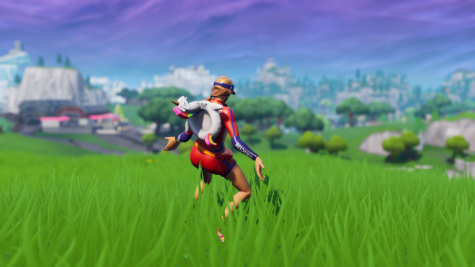Fortnite Dances Its Way Into the Courtroom
Dec 27, 2018

The lifeguard skin “sunstrider” dances on top of the beautiful hills of Fortnite after an epic Victory Royal. Fortnite introduced microtransactions in the form of the Item Shop and the BattlePass, allowing players to spend real life currency for in-game skins and emotes. This emote in particular, “Orange Justice,” is so popular, even Mrs. Obama and Santa Clause performed it live!
Here we go again, another lawsuit against the gaming behemoth known as ‘Fortnite.’ This time, three prominent pop culture icons have come out against Epic Games— Russell Horning, aka “Backpack kid,” who popularized “The Floss,” rapper 2 Milly, who created the “Milly Rock” and lastly, Alfonso Ribeiro, who created “The Carlton” from “The Fresh Prince of Bel-Air.” Will any of these challengers be able to topple the giant? Or will it go the way of the PUBG suit?
Now, while Fortnite hasn’t technically broken the law, they have acted immorally by using people’s creations without permission, credit or any of the revenue from the dances going to the original creators.
Fortnite has used these dances to foster engagement within the game, making people want to pay for dances, generating huge amounts of revenue for the game. Since the release of the game, Fortnite has made $1 billion in revenue. That’s insane for a FREE-TO-PLAY GAME. And the worst part: none of the earnings have gone to the original creators of the dances.

Two players search in an airdrop, trying to survive against 100 other players. In 2017, PUBG’s parent corporation Bluehole claimed “that Fortnite may be replicating the experience for which PUBG is known,” and after trying to sue, PUBG Corp (the rebranding of Bluehole) dropped the suit.
I’ll try to spare you from a lot of the legal speak, and there’s a lot of it when it comes to copyright protecting dances and dance moves. In 2017, the laws for the copyright of dances was updated, squashing all two out of the three cases against Epic Games. Basically, “simple routines” or “short dance routines consisting of only a few movements or steps… [can not be registered in] the U.S. Copyright Office…even if a routine is novel or distinctive.” So this means moves like the “Milly Rock” or “The Floss” have no feet to stand on, legally speaking.
These varying legalities leave “The Carlton” in a grey area. “The Carlton” was recreated under the same circumstances as “The Floss” and “Milly Rock,” but it comes from a full dance that features multiple moves. If Ribeiro, who originally created the dance, is able to make a case for “The Carlton,” being an actual dance instead of a simple move, he could bring Fortnite’s case to its knees, forcing them to share revenue and possibly remove the dance from the game.
But now, after all of this legal talk and rumor that Fortnite is doomed and that a ‘90s sitcom actor will slay the monster, I believe that, ultimately, Fortnite will have to pay nothing to anybody, effectively getting away with highway robbery.
It’s gotten so bad that when young people see the original dances, they’re inclined to say, “That’s the dance from Fortnite!” while everyone who knows the original version groans in agony as they see their childhood ripped away from them and replaced animated characters dancing after acquiring that epic Victory Royale.

2 Milly introduces the “Milly Rock” in his 2014 song “Milly Rock x 2 Milly.” While 2 Milly’s dance gained popularity, when it was introduced in Fortnite people were doing it everywhere, kids and adults alike.
This whole situation is oddly reminiscent of the lawsuit against ‘90s rapper Vanilla Ice for the song “Ice Ice Baby,” which infamously ripped the entire bass cord from Queen’s song “Under Pressure.” The big difference is that song copyright is a bit more straightforward, but the moral precedent with the usage of creative property is the same.
While the claims against Fortnite will most likely disappear like PUBG’s suit, they’re still ripping off every creator that has worked hard enough to get their iconic dance into Fortnite. If Epic Games wants to remain a respected company and stay away from more lawsuits in the future, they need to begin asking permission from the original creators and start paying royalties, because let’s be honest, they’ve got enough money to spare.






Maxwell Yang ◊ Feb 8, 2019 at 1:25 am
Ayo bruh that’s my picture
Zach Schubert ◊ Jan 10, 2019 at 9:05 am
Justice for orange t-shirt kid!